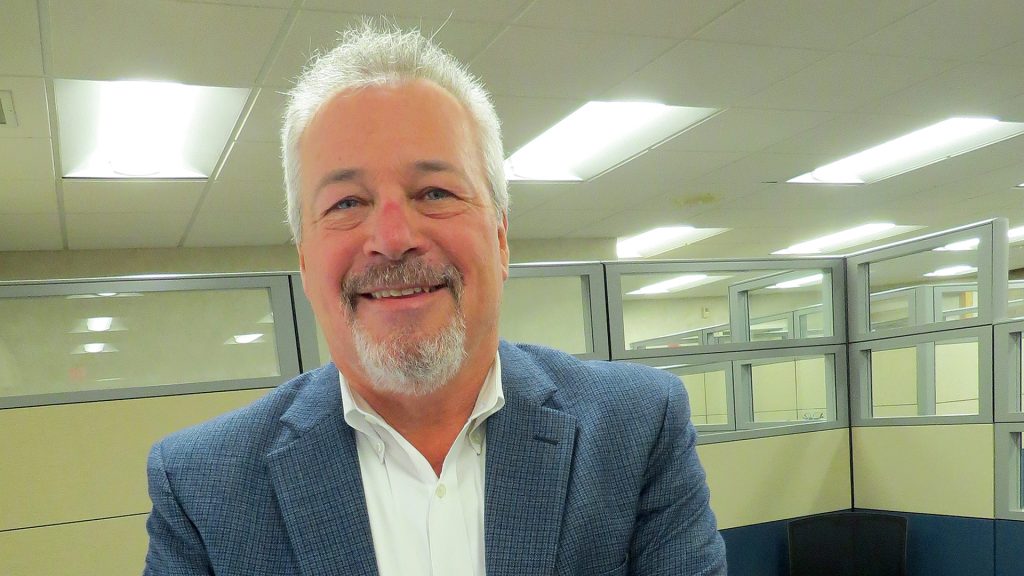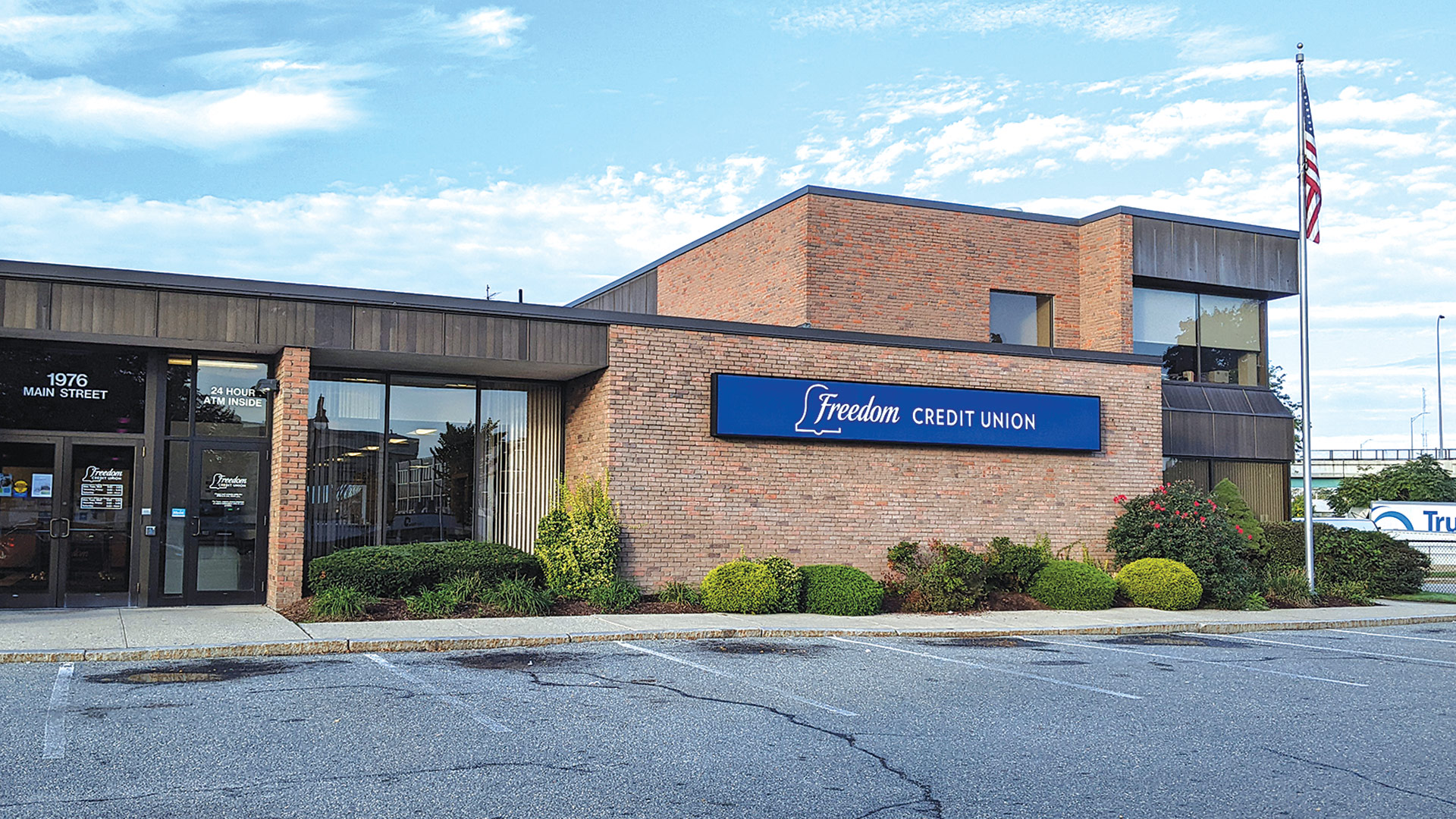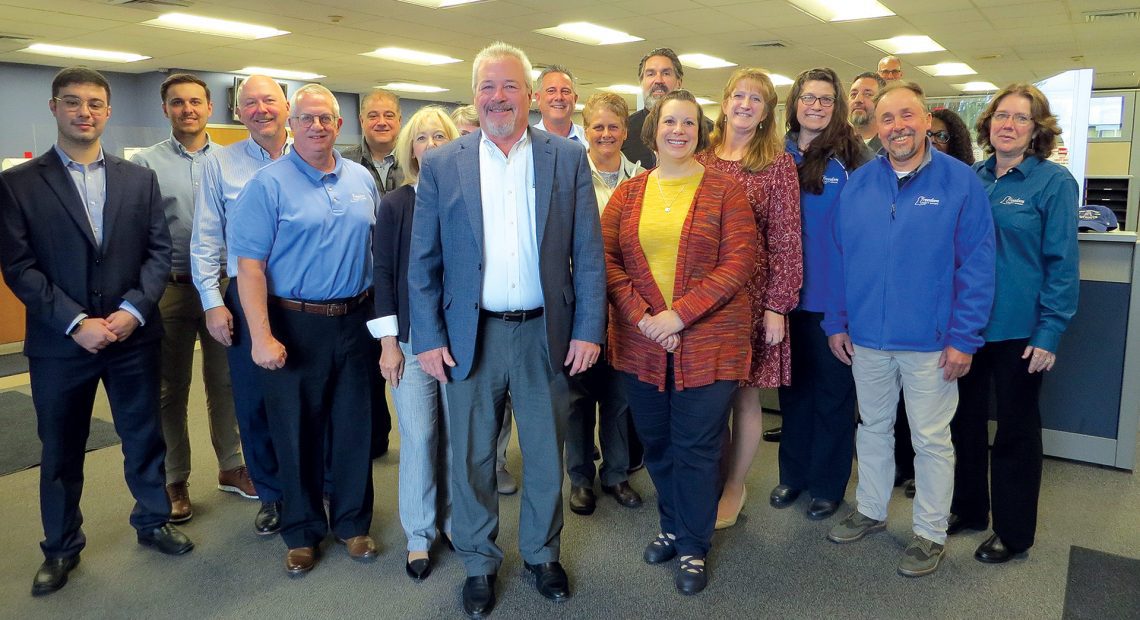Century Unlimited

President and CEO Glenn Welch (center) with some of his team.
When asked what might come next for Freedom Credit Union, Glenn Welch said simply, “we’re going to continue doing what we’ve been doing for the past 100 years.”
By that he meant … well, a whole lot of things, from continued growth and innovation to embracing new technology; from growing the base of customers to extending the institution’s geographic reach; from finding new ways to serve members to giving back to the community.
There will be more of all of that, said Welch, president and CEO of Freedom, who offered what amounted to a ‘state of the credit union’ report for BusinessWest on the occasion of its 100th birthday.
The milestone (July 22 was the official birthday) has been marked in various ways — from a 100-day summer food drive that raised $4,100 for the Food Bank of Western Massachusetts and collected 930 pounds of food for the Gray House, to a week of ice cream at all the branches in late July for members and employees; from raffles and giveaways for members to specials on loans and CDs.
“It’s a big milestone these days for a financial institution to be around that long,” Welch said. “So we wanted to celebrate with the community.”
Mostly, though, the institution has been quietly continuing those patterns of behavior listed above, he added, noting that he and his team are being both innovative and entrepreneurial as they go about writing the next chapter in a history that began with an institution known as the Western Massachusetts Telephone Workers Credit Union, formed when Warren Harding was patrolling the White House.
“It’s a big milestone these days for a financial institution to be around that long. So we wanted to celebrate with the community.”
Listing examples of both, he said Freedom will soon be introducing its first interactive teller machine (ITM) as well as credit cards and a new debit-card product. Meanwhile, it is continuing and broadening its push into Connecticut with the opening of a loan-production office on Elm Street in Enfield. Also, the credit union, which now boasts roughly $650 million in assets, more than 32,000 members, and 10 branches across Western Mass., has been making some inroads to service companies in the broad and ever-expanding cannabis industry in Western Mass., while continuing to aggressively pursue more business on the commercial-lending side of the ledger.
With the cannabis sector, the credit union recently started providing deposit and cash-management services for businesses in different kinds of businesses, said Welch, adding that this could become a vehicle for growth at Freedom.
“We have several clients that have signed on with us and we have a pretty good backlog of businesses that are looking to come on board with us,” Welch said, noting that the credit union is working with its regulator to make sure it is complying with guidelines for doing business with those in this sector.
It is certainly not the only institution looking to garner cannabis customers, he went on, adding that, as competition mounts, Freedom will work to remain competitive and secure market share in a sector where new businesses open every month, if not every week.
Cannabis was recently made legal for recreational use in the Nutmeg State, he went on, adding that this could be another avenue for growth in that market. “We think we’re in a good position with our expansion into that market.”
Overall, Freedom is still finding its footing in Connecticut, he said, adding that, over the next few years, it will explore opportunities to branch out south of the border, literally and figuratively.

Glenn Welch says the basic strategy at Freedom is “to keep doing what we’ve been doing for the past 100 years.”
“We’re going to explore our options in Connecticut as we get a foothold there,” he explained. “There could be a possibility of branching down there; we signed a two-year lease in Enfield, and we want to explore the market with the loan production first; we thought that was a good way to get a good foothold.”
For this issue and its focus on banking and financial services, BusinessWest talked at length with Welch about the first 100 years for Freedom Credit Union, and what is on tap for this Western Mass. institution.
Answering the Call
Tracing the history of the credit union, Welch said it started in a small office in the telephone-company building on Worthington Street, serving only employees of that large and fast-growing industry.
In 1978, the institution relocated to a new home on Main Street in Springfield’s North End, which still serves as its headquarters today. In 1987, the Western Massachusetts Telephone Workers Credit Union merged with Monarch Credit Union. As demand for the benefits of a credit union grew, the institution applied for a community charter. In January 2001, membership eligibility was expanded to include anyone who lived or worked in Hampden, Hampshire, Franklin, or Berkshire county, and in early 2020, further expansion of membership eligibility included Hartford and Tolland counties in Connecticut.
In 2004, the institution merged with FHBT Credit Union, and the name of the larger entity became Freedom Credit Union. And with that new name came geographic expansion, with new branches in Chicopee, Northampton, and, later, Turners Falls, Greenfield, Feeding Hills, Easthampton, the Sixteen Acres neighborhood in Springfield, Ludlow, West Springfield (after a merger with West Springfield Credit Union in 2019), and then Connecticut.
Throughout its history, Freedom has consistently sought out new opportunities to expand and bring its products, services, and mission to new zip codes, said Welch, while also looking for new and better ways to serve its members, said Welch, adding that these trends continue today.
Especially with its push into Connecticut, but also with its work to attract residents and businesses in its service area that are looking for options in the wake of a seemingly endless string of bank mergers, the latest being M&T’s absorption of People’s United Bank.
“We’re going to explore our options in Connecticut as we get a foothold there.”
Connecticut has become the next frontier for many banks and credit unions based in Western Mass., and so it is with Freedom, said Welch, adding that the new office in Enfield, which opened earlier this month, will include both a commercial-lending officer and a mortgage originator.
“We had a lot of people in Connecticut who wanted to bank with us, so that’s why we expanded our charter in 2020,” he said, adding that COVID obviously slowed the pace of progress into that state, but with the pandemic easing in most all respects, the credit union is expecting to see growth in the numbers of members from across the border.
Meanwhile, Freedom will continue and escalate what has been an aggressive push into the commercial-lending market on both sides of the border, another initiative that has been slowed somewhat by COVID.
“We’re trying to expand on the commercial side, but obviously not ignoring consumers,” he told BusinessWest. “We did hire a new hire lender for the Connecticut market; we believe there is a lot of opportunity there — on both the commercial and consumer side.”
Overall, the credit union began its push into the commercial market roughly seven years ago, he said, adding that it has been making good inroads since, with two lenders in this market and now the one in Connecticut.
Its legal lending limit is $7 million, with a large sweet spot of $2 million to $5 million, Welch explained, adding that this range leaves plenty of growth potential in a region dominated, on both sides of the border, by small businesses.
“We have a very experienced lending team — we’ve been in the market in a long time,” he said, adding that Freedom will be rolling out some new products in the next few months that will make it easier for companies to obtain small-business loans.
“We’ve partnered with a credit-union service organization with an online app where people can go, and they will make the credit decision for us, based on our guidelines in place,” he explained. “That’s how we hope to help the small businesses in the area.”
Another new service soon to be unveiled by Freedom will enable area retailers to offer financing for purchase of their products through the credit union, an initiative that he believes will help small businesses while also creating potential new members for the credit union on the consumer side.

The credit union’s headquarters have been located on Main Street in Springfield since 1978 — before it was called Freedom.
Overall, growth in membership has been steady, at perhaps 1% a year on average, which is typical of credit unions in this market, he said, adding that Freedom is trying to capitalize on the ongoing consolidation of the banking market and mergers like the one involving M&T and People’s United, which, by most accounts, did not go smoothly.
“I think that’s our biggest opportunity, especially in Connecticut, with M&T and People’s United being such big players in that market,” he said, adding that the credit union is conducting some marketing targeting customers of those institutions.
Meanwhile, as noted earlier, the credit union will soon roll out its own credit card as well as a new debit-card product, its first ITM, and other products and services aimed at making banking easier and more convenient for members.
“We just keep automating things as we try to make it easier for our members to do business with us,” Welch explained. “A lot of things are being done online, and I think we have very competitive products for that; if people want to apply for loans or open accounts, they can do it on their own time, but certainly we have the branch system in place to support them when they need help.”
By All Accounts
Looking at the business plan for the next several years, Welch said Freedom is looking at a number of growth opportunities — in Massachusetts, Connecticut, within the cannabis industry, in commercial lending, and with several new consumer products.
It is moving on several different fronts at once, with the goal of expanding its membership base, providing new and better products and services, and taking its mission in new directions.
These initiatives are new in some respects, but overall, they’re simply a continuation of what the institution now known as Freedom has been doing for a century.
George O’Brien can be reached at [email protected]








 Retirees say they are considerably less concerned than pre-retirees about their money lasting throughout retirement, but worry more about the financial and lifestyle implications of declining health, according to new research from MassMutual.
Retirees say they are considerably less concerned than pre-retirees about their money lasting throughout retirement, but worry more about the financial and lifestyle implications of declining health, according to new research from MassMutual.

